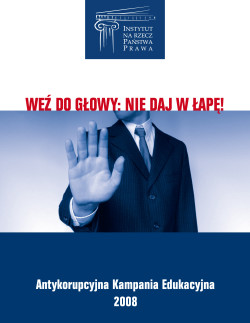Publishing activity of the Foundation is the realization of its statutory objectives: spreading the idea of the rule of law and the legal awareness of society. So far, publications have appeared on a wide range of content, including the issues of criminal law, intellectual property rights, legalization of foreigners’ stay in Poland and refugee law.
You are invited to familiarize yourself with our publications.
We invite you to read the report which is the result of monitoring carried out in the framework of the project “Monitoring the use of alternatives to detention of foreigners”, financed by the program “Citizens for Democracy” from the Financial Mechanism of the European Economic Area.
This report confirms that the introduction of alternatives to detention of foreigners in Polish legal system means securing the course of post-proceedings on the obligation to return and proceedings granting international protection. This had a positive effect on the situation of foreigners staying on Polish territory.
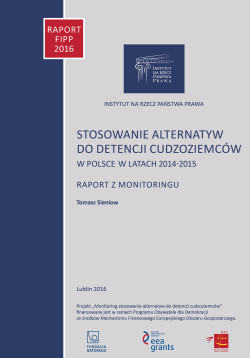
Within the framework of the project Information Center for Foreigners we’ve prepared a publication “Welcome PL”, which is to explain you the most important issues that you will have to face during your stay in Poland. We’ve tried the information to be presented in the most transparent way – in the form of charts, tables, calculations and questions-answers. We hope you’ll find the answers to questions you are interested in and that the Polish legal and social system, culture will ceases to be a big mystery. The publication is available in three languages:
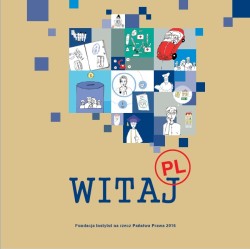
This publication was created within the project “Support Voluntary Return in the Lublin Region II” co-financed by the European Return Fund and the state budget. Acquis Return was created by the European Union policy in the field of irregular migration. The Union Acquis Retrun is return policy and law. An important element of “Acquis Return” development is its implementation on national level by the EU Member States and Schengen States.
The book contains: information on activities related to the forced return of foreign nationals in selected countries of the European Union, the jurisdiction of the European Court of Human Rights in the field of human rights protection in the Russian Federation, the issues related to the return policy of Norway.
We encourage you to read the book.
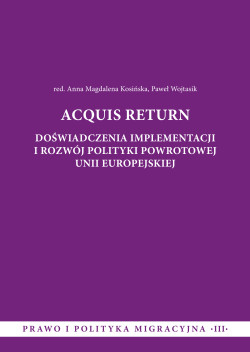
This publication was prepared in Polish – English and Polish – Russian versions. It would not have been possible without the support of the European Union. It is one of the outcomes of the project “Integration of Foreigners in the Lublin Region III”, undertaken by the Rule of Law Institute Foundation and co-financed by the European Fund for the Integration of Third-Country Nationals and the state budget.
The new institutions in the provisions of the Act on Foreigners fully justify the need for an in-depth reflection on the legal status of third-country nationals in Poland (starting with the stage of entry and stay on the basis of long-term national visas, through temporary residence permits, permanent residence, long-term EU residence permit, up to the institutions of residence permit for humanitarian reasons and a permit for tolerated stay). The present publication will serve people who apply the law on foreigners on a daily basis. It will also help foreigners in better understanding of the rights that they are entitled to.
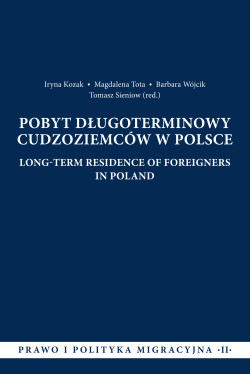
We would like to encourage you to read the publication “Welcome to Poland!” prepared in the framework of the project “Integration of the Foreigners in Lublin Region III”, co-funded by the European Fund for the Integration of the Third-country nationals and the state budget. The publication consists of information concerning access to medical help in Poland, educational system, basic family rights and obligations.
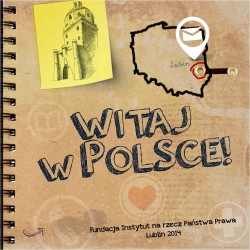
We are pleased to inform that the Rule of Law Institute Foundation within the project „Legal aid Center for Refugees” issued new publication. It was published thanks to financial support of European Refugee Fund, state budget and Lublin Municipality. “What? Where? When? that is a guide for refugees in Poland” is directed to refugees that reside in Poland, therefore to foreigners who applied for refugee status on the territory of Poland and to foreigners who received in Poland a particular type of international protection. The PART I of the guide is dedicated to the first group of foreigners, as it concerns the procedure of granting particular form of protection, while PART II of the guide is dedicated to the second group of foreigners. The whole guide is written in a simple manner, containing only the most helpful information – what, where, when and how you can verify particular issues, what makes this publication being somehow a guide for foreigner who recently has arrived to Poland and would like to know how the procedure for granting the refugee status looks like. The guide is also useful for people who are residing in Poland for longer period and have cases in which they require practical advices and help, particularly in cases before local authorities. Additionally, the publication is divided into two language versions: Polish and Russian, in order to make it easier for foreigners to find useful information that may require in their everyday life.
Electronic version of the publication is available here. However, free samples of the publication in a book form are available for everyone in the seat of Foundation.
Enjoy the reading!
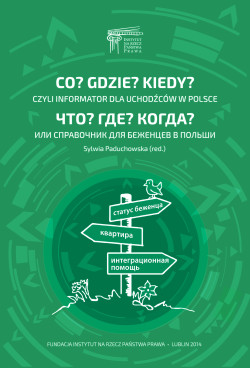
The publication was created in the framework of the project ” Monitoring the validity and reliability of the decisions regarding placement of persons applying for refugee status in guarded centers and detention centers for the purpose of expulsion,” funded by the Stefan Batory Foundation under the program Democracy in Action.
The report contains an introduction and five sections: Detention of foreigners and international standards of Human Rights protection (Tomasz Sieniow), Judicial practice of the use of detention of foreigners in Poland (Teresa Dębowczyk, Joanna Oleszkowicz), Conclusions and recommendations (Tomasz Sieniow) Recommendations of the UNHCR concerning detention (translation of Klara Tomaszek), and provisions relating to the placing of foreigners in guarded centers in the law on foreigners (version from March 6, 2013.).
A very important part of the report is developed in the UNHCR recommendations on alternatives to the use of detention against persons applying for refugee status.
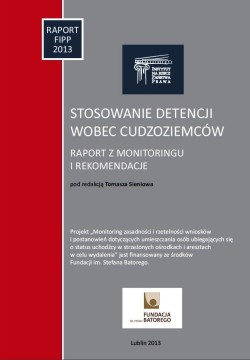
Publishing is aimed at foreigners seeking an information how to acquire polish citizenship as well as at workers of institutions and offices which provide foreigners with legal help. The following issues are mentioned there: acquisition of polish citizenship by law (by birth and repatriation), recognition as a polish citizen, conferment of polish citizenship and the special position of minor concerning acquiring of polish citizenship.
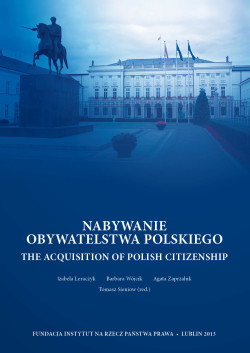
Authors: Anna Kosińska, Paweł Wojtasik
This publication is the next release of the project “Support for Voluntary Returns in Lublin Region” which was conducted by the Rule of Law Institute from 1 January 2010 to 31 December 2012.
The work includes the presentation of priorities of the EU return policy, the functioning of the European Return Fund, the presentation of Polish legal regulations in the field of voluntary and forced returns and the experience gained during the project.
The publication discusses legal changes after the implementation of the “Return Directive”. As part of the project “Support for Voluntary Returns in Lublin Region” a handbook has been prepared- “Voluntary returns. Law, good practices and recommendations.”
As part of the project “Support for Voluntary Returns in Lublin Region” a publication has been prepared – “Voluntary return as a priority of EU return policy.”
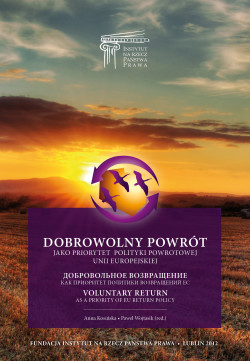
Authors: J. Gieroba, I. Precz, Delaine R. Swenson
We present the publication “The appeal to complete the formal defects, that is a brief guide to proper practice in student’s voluntary legal service ,” financed by the Operational Programme of the Civic Initiatives Fund.
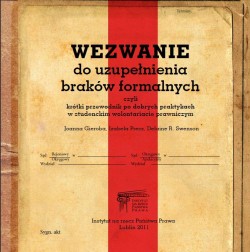
Authors: J. Gieroba, M. Gwiazda, A. Kosińska, P. Wojtasik (ed.)
We introduce the publication on voluntary returns, prepared within the project entitled “Support for Voluntary Returns in Lublin Region”, co-financed by the European Return Fund and the state budget.
This publication discusses in a comprehensive way the issue of voluntary returns in the light of state and community law, and includes recommendations for strengthening the capacity to carry out voluntary returns.
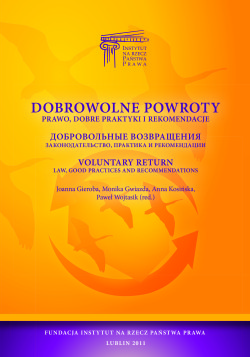
Editors: Józef Krukowski, Tomasz Sieniow, Mirosław Sitarz
On behalf of the Institute for the Rule of Law and The Association of Alumni and Friends of the Faculty of Law in the Catholic University, we invite you to read the sixth issue of the bulletin, entitled “Models of legal education. Experiences and Perspectives”, published by the Stefan Batory Foundation.
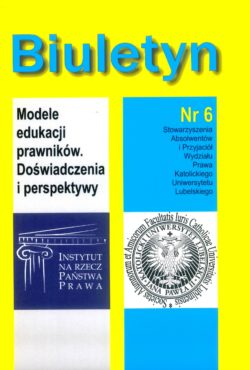
Poland and the European Court of Human Rights
Within the institutional grants the Institute for Rule of Law conducted an analysis of the judicial decisions of the European Court of Human Rights in cases concerning Poland, which resulted in some recommendations. The people in charge of the project are Prof. Delaine Swenson, Dr Kinga Stasiak and Dr Anna Szarek.
The research project had its start in the second quarter of 2010. The results of the experts work were presented in the form of the report on 10 June 2011 at a meeting devoted to the judicial decisions of the European Court of Human Rights. The meeting was organized by the Institute for Rule of Law Foundation in cooperation with the Department of International and American Law of Catholic University.
An analysis in this area was possible thanks to the institutional grant, which our Foundation received from the Stefan Batory Foundation in 2009 . We encourage you to familiarize yourself with the experts work: Raport “Poland and the European Court of Human Rights: Selected Issues and Recommendations”
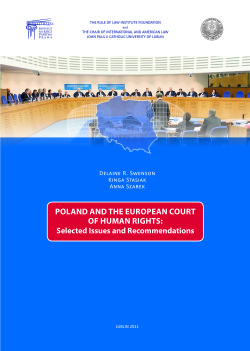
Authors: Tomasz Brzeziński, Arkadiusz Cudnoch, Bartosz Łągiewka, Szymon Milczanowski, Arkadiusz Siechowicz, Tomasz Sieniow, Delaine R. Swenson
Lublin – Agenda 2010 is a document that was based on the opinions of people who have been involved in the development of the city in the academic, local governmental, business, non-governmental and social areas for years, as well as people who thanks to the participation in the project can become the leaders of the change. They are also confronted with people who know Lublin and who can look at its situation with the bigger distance due to different rationales.
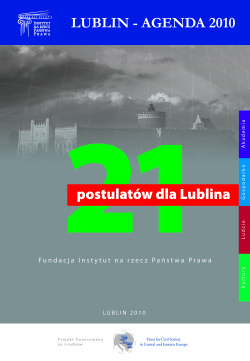
Authors: Wisdom Ejebugha (ed.), Monika Gwiazda, Dagmara Jachacz, Joanna Oleszkowicz, Grzegorz Pawłowski, Tomasz Sieniow (ed.)
This publication is addressed to a particular group of migrants, the citizens of Nigeria, who came to Poland for various reasons and who made personal plans connected with Poland. Due to the fact that there are more and more such migrants in Poland, their problems are noticed not only by the Polish non-governmental organizations and state authorities, but also by international organizations. The United Nations and the European Union recognized the important problems of migration between Nigeria and Poland and they have decided to support the project “Migrant Rights: Nigerian-Polish Initiative”. We hope that thanks to noticing the problem of migration between the two countries by the international community we can improve the actual level of legal protection given to citizens of Nigeria in Poland.
The brochure includes a lot of useful information about the legalization of foreigners’ stay in Poland, about the access to employment, education and social services, and about their rights and obligations in case of the decisions on the expulsion from territory of Poland.
The project entitled “Migrant Rights: Nigerian-Polish Initiative” is financed within the European Commission-United Nations Joint Migration and Development Initiative, and implemented by the United Nations Development Programme.
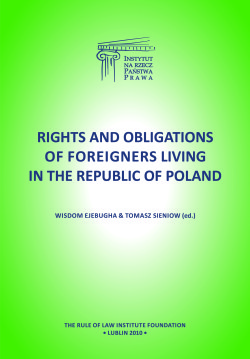
Authors: Monika Gwiazda, Justyna Jellinek, Teresa Jura, Joanna Oleszkowicz, Paulina Pankowska, Anna Pawelec, Tomasz Sieniow (ed.)
This handbook has been prepared both for people who are during the refugee procedure, and for those with completed procedure. The substantive extent of the publication involves the issues concerning the types of protection granted to foreigners in Poland, the stay of foreigners in Poland during refugee procedures, and the situation of foreigners who have received the refugee status in Poland, subsidiary protection or permit for tolerated stay. The handbook also describes in detail the proceedings for granting refugee status and the judicial control of the administrative decisions in the refugee procedure.
Due to the fact that the handbook is addressed primarily to foreigners who try to receive protection in Poland, it was issued in bilingual versions – Polish and Russian. However, it includes a lot of useful information for people who contact the refugees in the workplace.
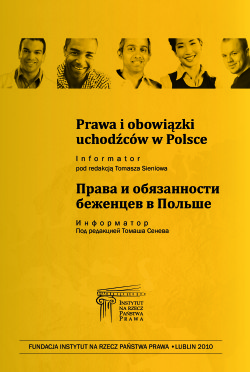
Authors: Joanna Gieroba, Monika Gwiazda, Anna Kosińska, Paweł Wojtasik (ed.)
We offer you one of the first publications in our market, dedicated to the institution of voluntary returns. The paper discusses the basic problems of contemporary migration, the issues concerning the protection of human rights in the context of voluntary returns, and the legal regulations in force in the European Union and in Poland. It also presents a group of beneficiaries, who may benefit from the voluntary returns, and the ways of the organization of returns – independently, with the help of the International Organization for Migration (IOM), or the Office for Foreigners (UdSC).
The publication was prepared within the project “Support for the Voluntary Returns in Lublin Region,” and implemented by the Institute for Rule of Law Foundation.
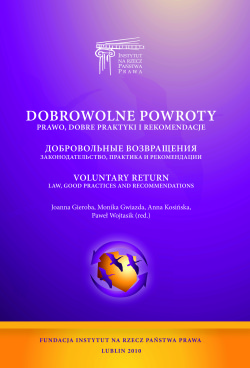
Authors: Monika Gwiazda, Dagmara Jachacz, Joanna Oleszkowicz, Magdalena Maciąg, Tomasz Sieniow (ed.)
Staying in the territory of a foreign country entails many responsibilities, starting with fulfilling the legal requirements for crossing the border, through obtaining permission to stay and to have fixed address, as well as getting the timely renewal of a visa. Polish law guarantees liberties to foreigners legally residing in the territory of Poland, which are often equal to Polish citizens’ liberties. The knowledge of rights and responsibilities can greatly facilitate a foreigner’s stay in Poland, and it is also a condition of their good integration with Polish society.
The integration of foreigners in the Lublin voivodeship is the title of the project implemented in 2009-2010 by the Institute for the Rule of Law. The project was co-financed from the European Fund for the Integration of Third-country Nationals and from the state budget. The activities of the Institute for the Rule of Law, which include legal assistance and integration addressed to foreigners legally staying in our country, are widely presented on the website www.migrant.lublin.pl. We hope that thanks to the handbook prepared by FIPP lawyers , this integration will be faster and easier and the foreigners choosing Poland as their second homeland will benefit from the guidance given in the handbook and they will derive an advantage for themselves and their families. We believe that our actions will result in a new quality of the integration of foreigners in our region.
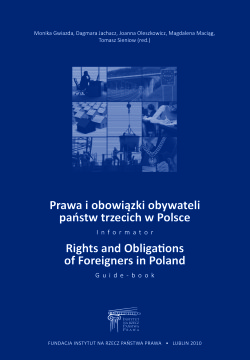
Authors: Anna Kosińska, Paweł Wojtasik, Tomasz Sieniow (ed.)
This publication is a trial to compile the information about the institutions working for foreigners and to make them accessible for those who are interested in them in a clear and legible way. In this handbook you will find contact details and the extent of the main actions of state bodies and agencies of state administration, local government entities as well as of higher education institutions, international and non-governmental organizations. We hope that the information given in this handbook will help foreigners who, making life choices, stop at the Polish territory for a longer time, and whose stay in Poland is only a short stage in their migrations.
This handbook was published within the “Lublin Regional Immigrant Support Network” co-financed from the European Fund for the Integration of Third-country Nationals and from the state budget. The aim of the project is to create the institutional support for individuals and institutions dealing with the problems of foreigners in our region. The network members regularly meet during working meetings and trainings, so that they can better solve problems emerging during the increase of migration. In addition, within the project Migration Library was created, with resources used by the institutions working with migrants, and a newsletter of network and website – www.migrant.lublin.pl – are edited. We hope that our actions will provide a new quality of integration in our region.
The brochure has been prepared in four languages: Polish, Ukrainian, English and Russian.
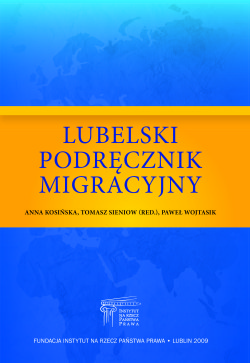
Authors: Monika Gwiazda, Dagmara Jachacz, Joanna Oleszkowicz, Tomasz Sieniow (ed.)
Staying in the territory of a foreign country entails many responsibilities, starting with fulfilling the legal requirements for crossing the border, through obtaining permission to stay and to have fixed address, as well as getting the timely renewal of a visa. Polish law guarantees liberties to foreigners legally residing in the territory of Poland, which are often equal to Polish citizens’ liberties. The knowledge of rights and responsibilities can greatly facilitate foreigner’s stay in Poland, and it is also a condition of their good integration with Polish society.
The handbook was issued within the project “Integration of foreigners in the Lublin voivodeship” and was implemented by the Institute for the Rule of Law. The project was co-financed from the European Fund for the Integration of Third-country Nationals and from the state budget.
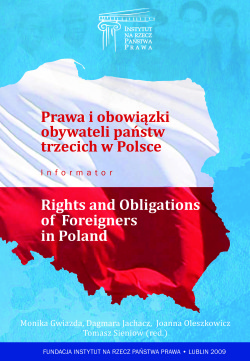
Authors: Roman Głogowski, Teresa Jura, Joanna Oleszkowicz
This handbook on rights and obligations of people who have received refugee status in Poland, subsidiary protection or tolerated stay, is an attempt to help foreigners and administration officials of state and local governments in understanding the legal system in Poland after the introduction of regulations resulting from the need to implement European law. This is especially important for solutions in a new institution, that is the subsidiary protection.
Since 2004 the Institute for Rule of Law Foundation has run a program of legal counseling to refugees, supporting the integration of refugees in Poland, firstly by giving the help to UNHCR, and since 2006 also by working within the projects financed by the European Refugee Fund. During our work we often encounter the problems concerned with the issues selected in the handbook. Therefore, their choice is not accidental. We believe that thanks to a simple presentation of the issues related to receiving the residence permit in Poland, to looking for the integrative help, the social assistance, family benefits, to taking advantage of health care and conditions for taking the job, the process of the integration of foreigners in Poland will become a little bit easier. The handbook was prepared in two languages (Polish and Russian), so as to both foreigners and people could use it. We hope that it will be helpful to you and we will be able to improve and update it in the future.
Issuing the handbook was possible thanks to the financial support of the Governor of Lublin. This action completed the legal aid for refugees constantly provided by our Foundation thanks to finances got from the European Union within the European Refugee Fund.
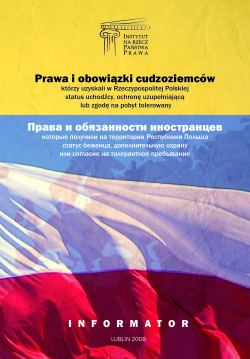
A team of experts: Marlena Gilewicz, Jacek Izydorczyk, Łukasz Lewandowski, Dariusz Raczkiewicz, Delaine R. Swenson, Małgorzata Wasylczuk, Paweł Wiliński
Coordynator: Marek Siudowski
The paper is the result of the research on the application of the preventive detention in Poland. It was prepared primarily with the regard to the practical problems faced by legal practitioners during the various stages of the application of the regulations governing the described institution. The report is to be an attempt to give the answer to socially important questions about the application of the preventive detention in Poland. It also includes recommendations aimed at the particular groups of legal professions, concerning the practice of using the preventive measure of isolation.

Authors: Tomasz Sieniow, Wojciech Włodarczyk
The awareness of the importance of protecting the intangible properties in the innovative activities of enterprises is of the biggest concern. No less important is noticing the benefits and threats linked to taking advantage of others’ work results available on the Internet in commercial activity. Therefore, we hope that the publication provided to the readers will contribute to the formation of the innovation culture among entrepreneurs, making intellectual property an important part of the business assets and to the respect for others’ intellectual property.
During the preparation of this publication the authors used the handbook written by them, entitled “Intellectual Property in the Information Society,” published in 2007 by the Institute for Rule of Law Foundation and the Patent Office. The presented issues were updated and expanded with the approval of the Foundation. We hope that the effects given to reader’s hands will result in the efficient navigation on the information highway.
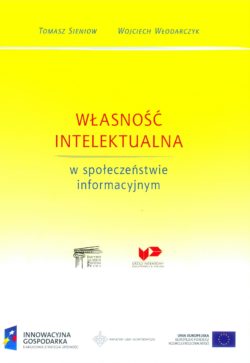
Authors: Tomasz Sieniow, Wojciech Włodarczyk
This handbook is a compilation of the basic regulations of intellectual property rights. The authors in a concise and accessible way explain the concepts of intellectual property rights, copyrights, intangible goods rights and their functions in the binding system of law. The handbook raises the issues of copyright on the Internet, elaborating on the regulation concerning i.a. downloading and uploading files on the net, coping MP3 files, software piracy and Internet service providers’ responsibility for the actions of their users. The issue of trademarks in the context of the Internet was also touched upon.
The publication was released within the project “The youth educational campaign for the protection of the intellectual property rights on the Internet”, and was co-financed by European Union within the grant program “Increasing public awareness and strengthening the role of non-governmental organizations in advocacy and monitoring” (Transition Facility 2004).
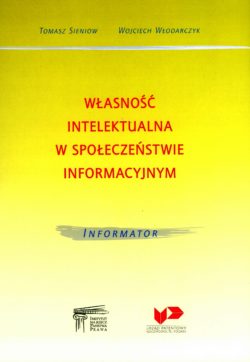
Author: Marek Siudowski
Editors: Tomasz Sieniow, Delaine R. Swenson
Translators: Marzena Rzeszót, Bartek Sobala, Anna Węglarz
The right to court is so important as it involves every citizen. Nowadays, in the contemporary state of law the courts have become the ultimate arbiter of disputes, which is indeed the consequence of progressive jurisdiction in all life areas, of the universality of the principle of legality as well as of the absence of more reliable methods of settling disputes. Currently, the role of courts in the life of every citizen is constantly increasing. The current cases to be dealt with in a Polish courts were a few years ago known to Polish citizen only from U.S. media reports. The courts decide on euthanasia consent, settle disputes on the issue whether it is better to be born or not born (claims of “wrongful life”), on issues of public authorities’ liability for the unlawful establishment of law, etc.. The scope of the judicial cognition is increasing. In such situation, the answer to the question of how exactly the right to court should be shaped is very essential.
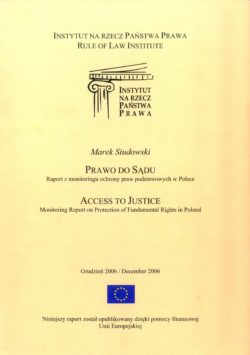
“Take to the mind: not under the table! Anti-corruption education campaign” project aims to increase the awareness of secondary schools students of the Lublin voivodeship of corruption in various spheres of social life and to familiarize them with the methods of combating this phenomenon.
The publication was based on the views expressed in the literature (the late prof. Henryk Popławski, the late prof. Mieczysław Surkont, prof. Andrzej Zoll, dr Przemysław Pałka, dr Anna Kubiak and Małgorzata Reut).
It was published within the “Take to the mind: not under the table! Anti-corruption education campaign” project, which was implemented thanks to the Transition Facility Program 2005 “Grants for non-governmental organizations to foster anti-corruption social initiatives”.
